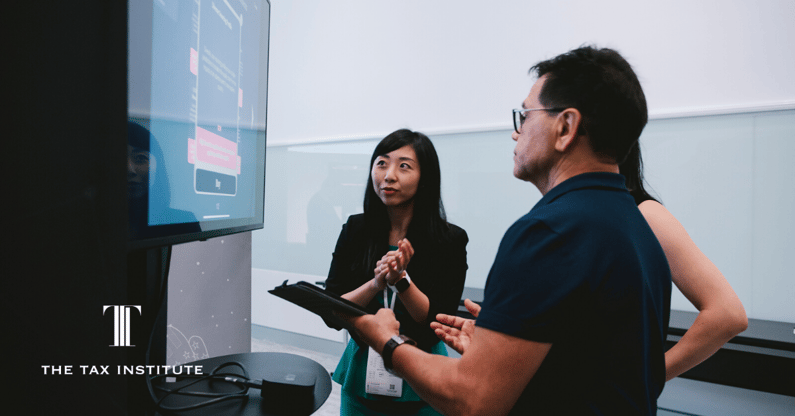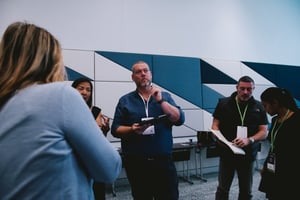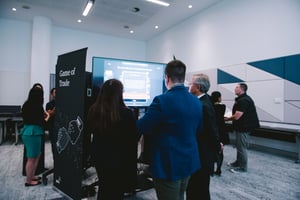
Global pandemics, increasing economic disruption and the significant impact this is having on Australian businesses led to an innovative approach to learning at The Tax Summit.
PwC Partner, Ben Lannan, ATI, orchestrated an interactive gaming session around the current global trade war conditions against the backdrop of an economic crisis, in order to prepare participants for real-world economic events and test possible responses.
Challenges for business in the current trade war
The protectionist measures introduced in the trade war between China and the US are having a tangible economic impact on global markets, and businesses are struggling to respond.
“At PwC, we’ve been supporting many Australian and global businesses to respond to the trade war, and the use of protectionist measures undertaken by many governments, like tariffs,” Ben says.
“This includes non-tariff barriers, such as regulation, certifications, licenses, quotas, and dumping duties that are currently being imposed by various governments. This trade war has been brewing for many decades, and has simply escalated in the last few years, and it is impacting many businesses in a negative way.”
In difficult times there lies opportunity
Ben says the current global trading conditions are unlikely to be mitigated in the future, but the news isn’t all bad, as there is opportunity for businesses to get ahead when they better understand the issues.
“Many businesses have been impacted by the current trade environment, particularly those who source goods in China and sell to the US. So we aim to put participants in the shoes of a fictional business based on a real business profile to test assumptions around the extent of impact and the range of measures that can be used to mitigate them,” Ben explains.
“There’s been a long process of integrating supply chains globally, and the ‘made in the world’ mantra has crept up on people. The complexity of supply chains isn’t easily unpicked or understood."
“We aim to have a broad conversation about the uncertainty affecting global value chains, and the costs to business, and strategies to mitigate those costs while identifying opportunities.”
Enter the trade war simulation
The Tax Summit this year offered more than traditional education streams with lectures and factsheets. How is your business impacted by the trade war? saw participants split into teams, to work together and play competitively while responding to different economic disruptors.
The session used technology including mounted screens showing ‘live breaking news’ and connected iPads to control the game of trade, in order to engage with topical subject matter like the US/China trade war. The simulator even included potential supply chain disruptions based on the current COVID-19 (Coronavirus) pandemic.
“This way of learning how to solve real issues in times of crisis was not about having another paper to read, this was about getting participants to engage in a different, interactive way about a very serious subject matter,” Ben says.
“This session at The Tax Summit was particularly great for SMBs who don’t have the resources to employ international trade and compliance managers.”
Can anyone win a trade war?
 During the workshop, three teams representing identical Australian retail operations, with significant reliance on sourcing products from China, played over six periods. In each period, macro issues including legislative changes and other regulatory factors outside of their control were presented to the teams, who had only a few minutes to make decisions about what investments to make in the next period.
During the workshop, three teams representing identical Australian retail operations, with significant reliance on sourcing products from China, played over six periods. In each period, macro issues including legislative changes and other regulatory factors outside of their control were presented to the teams, who had only a few minutes to make decisions about what investments to make in the next period.
Importantly, these investments had both long and short term implications for the fictional businesses, requiring fast and co-ordinated teamwork to get them right.
In the end, one team had more capital, while another had achieved higher ‘brand points’ (the two KPIs that determine game outcomes), provoking a valuable discussion about the relative merits of each. Ben pointed out to the teams that these kinds of discussions are the real value of playing the trade war simulation.
How a gamified simulation stimulates the right conversations
Beyond the team-based competition, the trade war simulation was an opportunity for executive and management teams to see how their dynamic works in a real-time decision-making environment. Perspectives on different issues and the thinking behind decisions made in the game provided participants with an understanding of team dynamics in a high-pressure and high stakes situation.
“This interactive session at The Tax Summit allowed practitioners to work together in teams to play through a series of real-world economic events and test responses, as well as exploring potential options to mitigate and/or exploit the impacts,” Ben adds.
Why was gamification critical in times of a crisis?
Ben stresses recent research has found Australian CEOs are lagging in making the necessary adjustments to challenging trade environments, and there is a growing need for Australian businesses to be more reactive and flexible - and consider supply chain re-organisation.
Since last year, PwC has been rolling out the gamification of education globally as a tool to support clients in understanding the impacts of trade wars, and has received extremely positive feedback.
“It’s great to bring a group of people together who might be buried in the detail of operating their business and take them outside their day job, in order to learn how to better respond to externalities and significant disruptors,” Ben adds. “These sessions are quite flexible and adaptable, we can make it quite real and relevant to client circumstances.”








